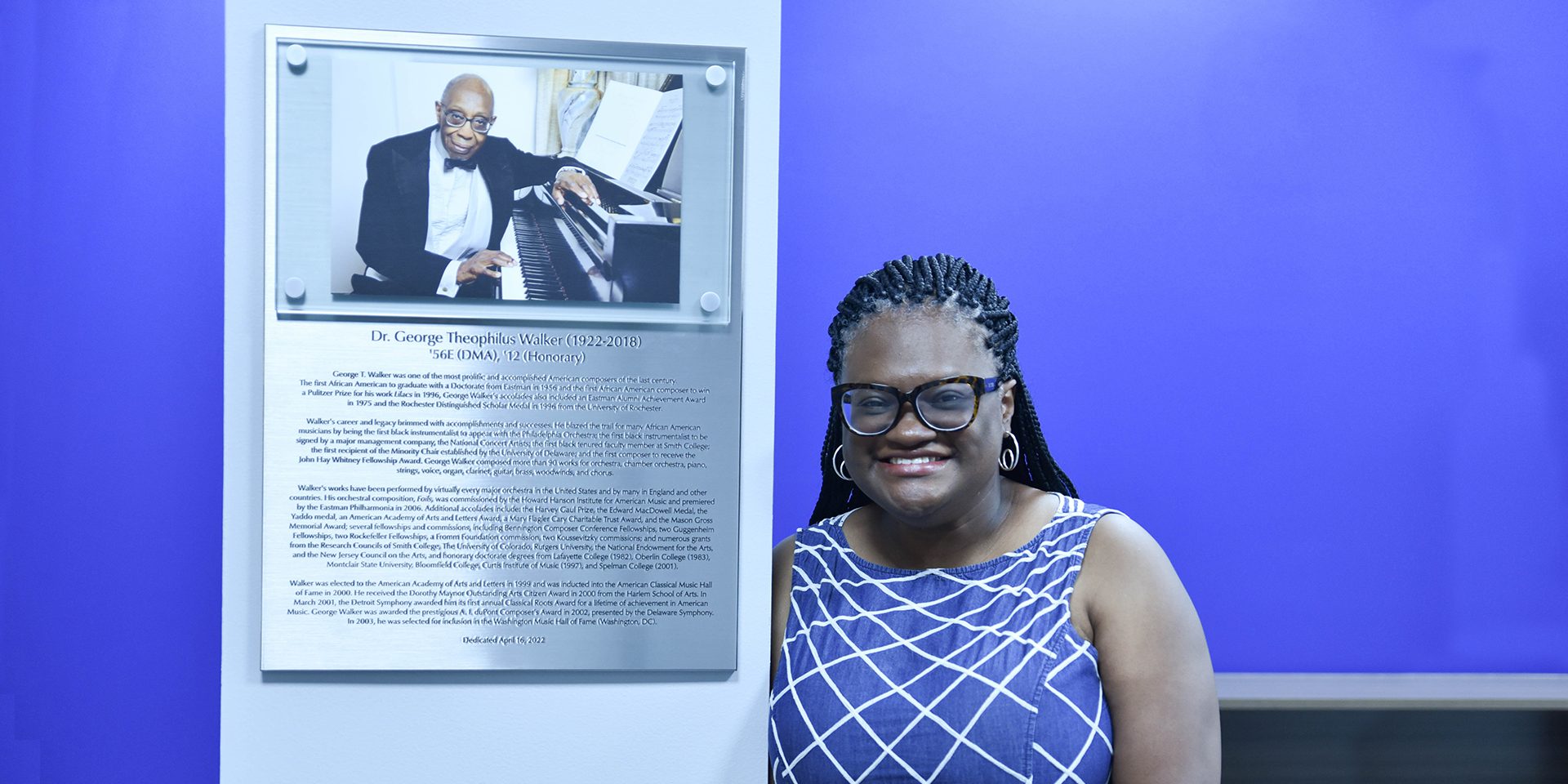This article was originally published in the Summer 2022 issue of Eastman Notes magazine.
Efforts on behalf of equity and inclusion have been ongoing and continued priorities at Eastman. As we have “opened the doors” to our community for our centennial, we have also renewed our focus on these important topics.
In spring 2020, Dean Jamal Rossi called together an Action Commission for Racial Justice which initiated an extensive process of interviews with faculty, staff, and students about institutional racism. Many of the answers were alarming and concerning, but many were illuminating, leading to ideas and recommendations that Dean Rossi and Eastman’s administration were determined to put into practice as soon as possible.
By the spring of 2022, Dean Rossi was able to report on several initiatives made at Eastman in direct response to the Action Commission’s Report, which is available on the Eastman website, as are updates (available at esm.rochester.edu/equity/).
The most visible evidence of Eastman’s new emphasis on diversity is our new George Walker Center for Equity and Inclusion in Music, which was dedicated in April 2022 and will be fully operating by the beginning of the fall semester. This spring, Dr. Crystal Sellers Battle was appointed Eastman’s first Associate Dean and Director of Equity and Inclusion (see “Creating A Space for All,” below).
In announcing Sellers Battle’s appointment, Dean Jamal Rossi lauded her “proven track record of dedication and success in furthering issues of diversity, equity, access, and inclusion in every community she has been. We are excited about … all that our community will accomplish together in the years ahead.”
In her first message to the Eastman community, Dr. Sellers Battle encouraged us: “Let’s lace up our shoes and get to the starting line! It’s a marathon, not a sprint, but we will do it together.”
The Center was formally dedicated on April 9 at its new home in Miller Center, with guests that included Gregory and Ian Walker, sons of George Walker ‘56E (DMA), ‘12 (HNY), the Pulitzer Prize-winning composer for whom the Center is named.
The space that was created in Miller Center includes a Director’s Office, a second office, and a communal area for activities and group discussions. Displaying a prominent plaque about its namesake, it is a bright, attractive space, and Crystal Sellers Battle hopes it will be a welcoming one, particularly for Eastman students.
Eastman’s centennial music commissions, detailed in the Winter 2022 Eastman Notes, reflect a conscious effort to reflect diversity in these commissions, which have included new works by Han Lash, John Clayton, André Myers, Maria Schneider, Anthony Barfield, Augusta Read Thomas, Jon Batiste, Anthony Davis, and many other composers from under-represented communities.
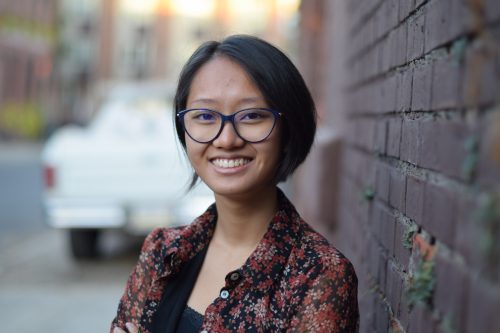 Another composer was Eunmi Ko ’06E (MM), ’12E (DMA), who joined forces with colleague Ania Vu ‘17E to curate The Music She Writes, a series of four virtual concerts featuring 25 works by living female composers across Asia. Funded with an Eastman Departmental Diversity Initiative Grant, The Music She Writes was originally broadcast on Eastman’s YouTube channel in April and May 2022 and is now archived at themusicshewrites.com.
Another composer was Eunmi Ko ’06E (MM), ’12E (DMA), who joined forces with colleague Ania Vu ‘17E to curate The Music She Writes, a series of four virtual concerts featuring 25 works by living female composers across Asia. Funded with an Eastman Departmental Diversity Initiative Grant, The Music She Writes was originally broadcast on Eastman’s YouTube channel in April and May 2022 and is now archived at themusicshewrites.com.
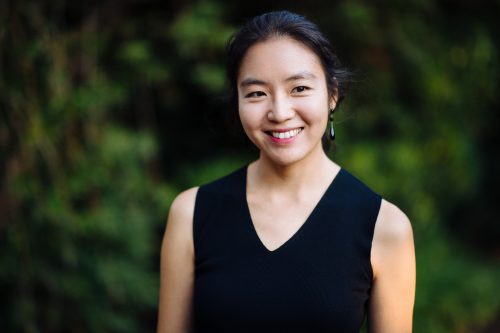
Celebrating The Music She Writes: Ania Vu (top); Eunmi Ko (bottom)
Interest in underrepresented composers has extended to our faculty and student recitals, and available repertoire is boosted by the Sibley Music Library’s push to acquire the published catalogs of music by prominent African American, Hispanic, and women composers; see this interview with Sibley Librarian Jonathan Sauceda.
In addition to our commissions, Eastman’s orchestras and choruses also enriched their repertoires with music by William Grant Still, Jessie Montgomery, Ethel Smyth, and Florence Price. The Eastman Wind Ensemble presented a concert of music by five women composers as part of the 2022 Women in Music Festival.
Musica Nova director Brad Lubman (who conducted the premiere of Augusta Read Thomas’s commission Dance Mobile in March) has stated that he recently began “to include more composers from groups who have been historically underrepresented, in a more consistent way than ever before.” Recent programs included music by Olga Neuwirth, Francesca Verunelli, and Olly Wilson, among many others.
Perhaps the semester’s most impressive example of diverse musical repertoire was Eastman’s first presentation of a complete opera by a BIPOC composer: the illustrious 18th-century musician Joseph Bologne, Chevalier de Saint-Georges, who was also a virtuoso violinist, conductor, and swordsman. Bologne’s L’Amant anonyme (The Anonymous Lover), presented by Eastman Opera Theatre in May, is, according to master’s degree candidate and director James Mitchell, “a charming tale of love and hidden identity” within a romantic triangle.
The story takes on poignancy when one considers that Bologne, who was born in Martinique in 1745, was prohibited from marrying a white woman in his adopted home of France, and thus also forced to be
an “anonymous lover.”
Bologne was a widely admired musician, earning the nickname le Mozart noir. As the opera’s music director Wilson Southerland points out, Bologne’s fame preceded Mozart’s in France – and the two men were friends, though Bologne outlived Mozart by several years.
After Bologne died in 1799, his reputation plummeted in Napoleonic France. His music was mostly unpublished and unperformed, and his operas lost except for L’Amant anonyme. Thanks to growing interest in composers of color throughout history, L’Amant anonyme is increasingly popular with student and professional groups; Eastman’s elegant production made it clear why.
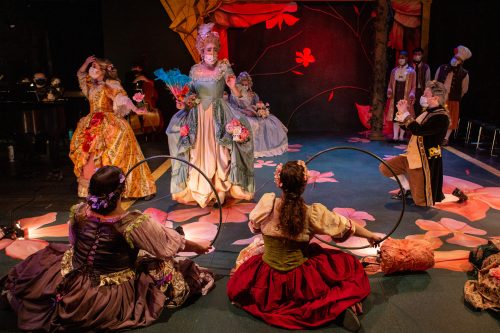
A happy ending after 242 years: the finale of Joseph Bologne’s L’Amant anonyme performed by Eastman Opera Theatre.
“Following Saint-Georges’ death,” James .Mitchell explains, “his impressive body of work fell largely into obscurity. This production of L’Amant anonyme provided an opportunity to experience the beauty of Saint-Georges’ masterful writing and to work against the anonymity thrust upon him by centuries of systemic racism.”
In the past two years, Eastman has also invited an increasing number of BIPOC guest artists and scholars to present at the school. One of the most important was the award-winning pianist Awadagin Pratt. His presentation Black in America, given in Kilbourn Hall last October during the College Music Society convention, so impressed Dean Rossi with its honesty and directness that he invited Pratt to repeat it in Rochester. He returned in April in a joint presentation with the Rochester Philharmonic Orchestra.
In Awadagin Pratt: Black in America, Pratt fused musical performances and personal reminiscences to contrast his fame as a musician with his encounters with police as a Black man, often referred to as “Driving While Black”. “This experience unfortunately is incredibly common, regardless of someone’s ‘success’ or status,” said Pratt. “My hope and desire is that with understanding will also come change.”
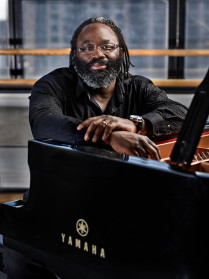
Pianist Awadagin Pratt: an eloquent presenter of the dilemmas of being Black in America.
Pratt invited several Eastman students to perform with him as part of Black in America. The Kodak Hall presentation was followed the next morning by facilitated group discussions with students, faculty members, and staff members.
Another very visible manifestation of interest in diversity was last spring’s return of Eastman’s Women in Music Festival, one of the school’s most visible symbols of diversity from 2005 to 2014. This year included a virtual talk by Mexican composer Georgina Derbez. The festival’s director and founder, Sylvie Beaudette, notes that music, music-making, and scholarship by women is more mainstream in 2022 than it was in 2005 – but more changes are necessary.
“I think that the ‘Me Too’ movement, The Black Lives Matter movement, and discussions about gender identity have helped renew the importance and necessity of having such a festival. A composer friend of mine said that the reason she started writing music so late in life was because she had never heard of women composers until she was an adult. This would not happen today for female students, but it still is a reality for BIPOC students who often don’t see themselves in the music curriculum.”
Sylvie Beaudette was also a coordinator of two Sensory-Friendly Concerts on April 12 and May 3. This ambitious collaboration with Autism Up, Spectrum Creative Arts, Mary Cariola High School, ARC of Monroe, and chamber music students from the Eastman to Go program was a completely new concept for our school.
“Audience members were invited to vocalize, laugh at funny sounds, and dance to upbeat music,” Beaudette explains. “Colorful photos illustrated each movement or moods of a piece, as well as some of the songs’ lyrics. Attendees could bend fidget toys in the shapes of whole notes, eight-notes, rests, etc., an opportunity to learn a bit about music notation in a tactile way.”
The preparation paid off. Audience members praised the performances as “great” and “cool.” Alexandra Stokes, flutist of Quintastrophe! woodwind quintet, called the audience “one of the best we’ve ever had because they clapped and cheered whenever they felt like it.”
According to Eastman to Go director Mark Kellogg, “Sensory friendly concerts are happily becoming an important offering for orchestras and chamber music groups. Exposing our students to this type of experience better prepares them professionally and develops a greater sense of empathy for audiences who may have particular needs or face different types of challenges.”
Sylvie Beaudette’s efforts in reviving the Women in Music Festival and in developing the Sensory-Friendly Concerts were rewarded later in the spring when she, along with student Brianna Garcon, received the Eastman Diversity Award.
In May, the Eastman Community Music School (ECMS) and Rochester musician Jimmie Highsmith Jr. announced the creation of the Hosea Taylor Jr. Memorial Community Band. Taylor, who died in 2016, was a well-known local saxophonist, mentor, and community activist. The program, which has been held at East High School every other Saturday beginning in June, is open to any City of Rochester resident aged eight or older, at any level of experience. Faculty members include RPO and Gateways Festival trumpet player Herb Smith ‘91E, director of the Eastman Youth Jazz Orchestra, and Gateways Director of Programs (and former ROCMusic director) Armand Hall.
The Pathways program, begun by ECMS in 1997, provides scholarships for dedicated and talented Rochester City School District students to pursue music at Eastman. Students from underrepresented communities account for more than half of the Pathways graduates.
In the last two years, Eastman has made an organized effort to recruit a more diverse student body and has continuously reviewed the undergraduate curriculum with an eye to greater equity and inclusivity. The continuing work and witness of Eastman students in student government and performance is crucial in creating a more diverse atmosphere at our school; in the words of Sylvie Beaudette, “Our students are deeply engaged in advocacy work, which gives me hope for the future.”
Representatives of Eastman’s Black Student Union (BSU) were important partners in the Action Commission and in the creation of the Racial Justice Report, and the BSU continues to play an important part. Activities last semester included an online concert series in February celebrating Black History Month, as well as Table Talk online discussions that earned this organization a “Rocky” award for programming from the University; BSU President Brianna Garcon also received this year’s Susan B. Anthony Award.
Representation Matters was launched in 2021 by Travon Walker ’21E to introduce middle and high school students to music created by BIPOC musicians, often overlooked in classical music studies. Walker and 20 Eastman students brought the program to the Irondequoit, Penfield, and Webster school districts in 2021, and the project returned to Webster Thomas High School in March 2022.
According to a 2022 participant, soprano Brittney Burgess, “The students truly were engaged from beginning to end. They interacted with us throughout the performance and after as well. There were over 100 students and about twenty students asked us questions. It’s been a great experience.”
In the fall semester, Alexis Prescott, a second year Master’s student in Music Teaching and Learning, joined Crystal Sellers Battle as her graduate assistant at the George Walker Center. Our Morning Chamber Music series will continue its presentation of diverse alumni in the spring 2023 semester with cellist Jeff Ziegler ’95 and baritone Malcolm Merriweather ‘10E (MM). In November, Eastman Opera Theatre will present Lear on the Second Floor by Anthony Davis, the Pulitzer Prize-winning composer of The Central Park Five; in December our long list of centennial premieres culminates with a new work honoring the Haudenosaunee Confederacy, on whose land Eastman stands, by Davis and United States Poet Laureate Joy Harjo, who will narrate it.
And next spring will bring another new adventure for EOT, and for Eastman: a Kodak Hall production of the Mexican composer Daniel Catán’s Florencia en el Amazonas, directed by our new Assistant Professor of Opera Antonio Cardenas, and sung in Spanish.
“A musical community that is rich with cultural, social, and intellectual diversity is key to our success as a music school,” Dean Rossi has said. “While there remains much to be accomplished to ensure that our community is one in which every person is welcome, safe, respected, and appreciated, we continue to take definite actions in support
of Eastman’s commitment to diversity, equity, inclusion, and access.”
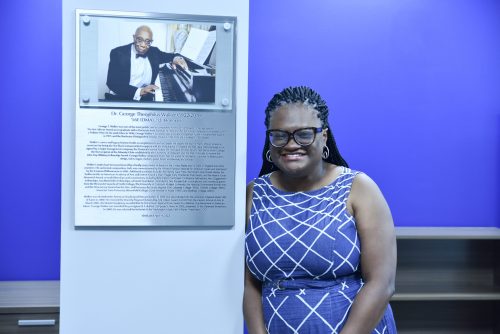
Listening and learning: Dr. Crystal Sellers Battle, with the namesake of the George Walker Center for Equity and Inclusion in Music.
Creating A Space for All: An interview with Crystal Sellers Battle
In early June, Dr, Crystal Sellers Battle arrived at Eastman as our inaugural Associate Dean of Equity and Inclusion. In her own words, she is settling into her challenging job with “great excitement, nervous energy, and humility.”
She has been spending the summer with small groups of staff and faculty members “meeting me at the starting line, to get a feel for life at Eastman.” The fall semester will bring regularly scheduled group dialogues and other events sponsored by the George Walker Center. And by that time, Eastman students will be on campus to join the ongoing conversation.
“I’ll also be working on the longevity and support the office will need. It will take all of us to work together, as we move towards what’s to come.”
“The joy of being able to marry my love of music and passion for equity work is life-giving!” she says, calling her experience as a young African American classical singer “my first equity work.” Her early experiences in gospel music informed her approach on gospel music, which informed her approach to classical performance; when teachers encouraged her to abandon this, she soon realized that “This is who I am – denying my roots in gospel music was taking away a piece of me.” Sellers Battle chose to embrace it instead, finding confirmation during her doctoral study at The Ohio State University.
After receiving her doctorate, Sellers Battle taught at Bluffton University in Ohio for eleven years, and then served as the Dean of Equity, Diversity and Inclusion at Juniata College in Huntingdon, Pennsylvania. She is co-founder of DIEMA (Diversity, Inclusion, and Equity in Musical Arts) Consulting Group LLC, and has presented to schools and conferences around the country about DEI-related challenges and initiatives; one of those schools was Eastman, where she spoke at a summer Arts Leadership Conference in 2021. After a national search, Dean Jamal Rossi offered her the position of Associate Dean of Equity and Inclusion.
“I am spending my first year listening, and learning ‘the Eastman way’ – our unique identity as a school,” Sellers Battle says. “Not trying to fix what doesn’t need fixing, but also learning about the changes that are necessary. Eastman’s Action Commission Report is the guide to my priorities as I learn how to navigate this need.
“We may not get everything right, but we will certainly get it wrong if we don’t try.”
